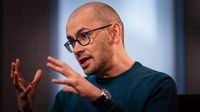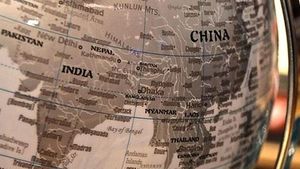Under the shadow of the Acropolis, in Athens' storied Odeon of Herodes Atticus, the future of work and learning took center stage on September 12, 2025. Demis Hassabis, CEO of Google’s DeepMind and 2024 Nobel laureate, delivered a message that resonated far beyond the ancient stones: in a world rapidly transformed by artificial intelligence, "learning how to learn" is set to become the most vital skill for the next generation.
Hassabis, a neuroscientist, former chess prodigy, and co-founder of the London-based DeepMind research lab, didn’t mince words about the challenges ahead. "It's very hard to predict the future, like 10 years from now, in normal cases. It's even harder today, given how fast AI is changing, even week by week," he told the assembled audience, according to AP. "The only thing you can say for certain is that huge change is coming."
The event, which also featured Greek Prime Minister Kyriakos Mitsotakis, was more than a ceremonial gathering. It was a candid conversation on how artificial intelligence is reshaping society, the workplace, and the very fabric of education. Hassabis argued that the traditional focus on static knowledge—memorizing facts or mastering a single discipline—won’t cut it in the coming era. Instead, he championed what he called "meta-skills," the ability to understand how to learn and to optimize one’s approach to new and unfamiliar subjects.
"One thing we'll know for sure is you're going to have to continually learn ... throughout your career," Hassabis said, as reported by StartupNews.fyi and NewsBytes. With AI evolving at breakneck speed, he suggested, the only constant will be the need to adapt. It’s a daunting prospect, but also an invitation for individuals—and societies—to rethink how they prepare for the future.
Hassabis’s credentials lend weight to his warnings and advice. He co-founded DeepMind in 2010, and the lab was acquired by Google four years later. In 2024, he shared the Nobel Prize in Chemistry for developing AI systems that can accurately predict protein folding, a breakthrough with profound implications for medicine and drug discovery. This achievement, as highlighted by Science X and AP, underscored the potential for AI to solve some of humanity’s most complex problems—if used wisely.
But alongside the promise of AI, Hassabis acknowledged the risks. He predicted that artificial general intelligence—a long-sought vision of machines as broadly capable as humans—could arrive within a decade. Such a milestone could usher in what he described as "radical abundance," a future where advances in technology create new opportunities and resources. Yet, he cautioned, this future is not without peril. The rapid pace of change could leave some behind, and the concentration of power and wealth in a handful of tech companies could fuel inequality and unrest.
Prime Minister Mitsotakis echoed these concerns, warning that unless the benefits of AI are broadly shared, public skepticism and social tension will grow. "Unless people actually see benefits, personal benefits, to this (AI) revolution, they will tend to become very skeptical," Mitsotakis said, as quoted by AP and NewsBytes. "And if they see ... obscene wealth being created within very few companies, this is a recipe for significant social unrest."
The Greek leader’s remarks reflected a growing unease across Europe and beyond about the unchecked rise of tech giants. Mitsotakis, who had just discussed plans to expand AI use in government services with Hassabis, stressed the importance of ensuring that technological progress does not simply enrich a select few. The stakes, he argued, are not just economic but democratic: if citizens feel excluded from the benefits of innovation, trust in institutions—and in the future—could erode.
For Hassabis, the solution lies in equipping people with the tools to adapt. He urged educators, policymakers, and business leaders to prioritize meta-skills—learning how to learn, thinking critically, and embracing lifelong education—alongside traditional subjects like math, science, and the humanities. "Meta-skills" are not just a trendy buzzword, he insisted, but the foundation of resilience in a world where job roles and required expertise can shift overnight.
His message was clear: the next generation will need to be nimble, curious, and ready to reinvent themselves repeatedly. The days of training for a single profession and coasting on that knowledge for decades are fading fast. Instead, Hassabis painted a picture of a world where adaptability and the capacity for self-directed learning are the keys to success.
The event itself was not without its lighter moments. Mitsotakis, whose father is Greek Cypriot, thanked Hassabis for rescheduling his presentation to avoid a clash with the European basketball championship semifinal between Greece and Turkey—a game that Greece ultimately lost 94-68. The gesture, noted by AP and others, was a small but telling example of the intersection between tradition and modernity, local pride and global innovation.
The Athens gathering has since sparked conversations across the tech world and beyond. StartupNews.fyi referenced Hassabis’s remarks in a wider discussion about the ethical standards and transparency of tech reporting, underscoring the broader relevance of the issues raised. The consensus among commentators is that, while the pace of AI-driven change can be dizzying, the core challenge remains deeply human: how do we prepare ourselves—and our children—for a future that is, by its very nature, unpredictable?
As Hassabis and Mitsotakis made clear, there are no easy answers. But if there is a roadmap, it starts with humility, openness, and a willingness to keep learning—no matter how much the world changes. In a time of uncertainty, that may be the most important lesson of all.





